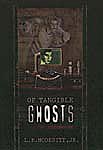Of Tangible Ghosts
by L.E. Modesitt, Jr

Of Tangible Ghosts is a difficult book to pigeonhole. It's a murder mystery and an espionage thriller, set in an alternate history, with environmental overtones. The book doesn't quite succeed on all these counts, but the alternate history is deep and interesting enough to make the book worthwhile.
Modesitt posits a world in which ghosts are a real electromagnetic phenomenon, created when humans die in great stress, fading over time. Conquest is a slow process because the ghosts created by war render territory uninhabitable until they fade. This has resulted in a noticeably different balance of power in October 1993, and a relatively weak Columbia--recognizable as the US, although the Dutch culture lingers in the Northeast--is racing against the powerful Austro- Hungarian empire to develop ghost-removal technology.
Doktor Johan Eschbach is a retired spy and minister, now teaching environmental economics at a small college in New Bruges. (A bit of sleuthing with an atlas suggests that New Bruges encompasses New Hampshire.) The murder of a member of the music faculty embroils Eschbach in a power struggle between several foreign governments as well as different factions in his own government.
The murder mystery is relegated to an afterthought, and Eschbach's solution to the espionage tangle is rather appalling and not entirely credible. But the plot moves swiftly, and the depth of the alternate culture causes Columbia to seem truly foreign even while it remains recognizable. Modesitt is rather occasionally rather blatant about pointing out the differences in his history; his characters have a tendency to recapitulate a few centuries of history whenever they discuss current events. But the little cultural asides that he works into conversations and his descriptions of Eschbach's daily minutiae lend depth and detail to his world.
Of Tangible Ghosts bears little resemblance to Modesitt's Recluce fantasies (no onomatopeia!) or his science fiction (no widespread violence and destruction); it's a more thoughtful book, and his prose is somehow cleaner. I enjoyed it, and I think it'll appeal to Modesitt fans who don't mind a calmer style.
"What about a sense of wonder? Take ghosts," I offered. "We see a ghost, and whether we like it or not, it exists. You can't touch it, exactly, and you can't tell exactly when it will appear. Doesn't it make you wonder?" I shrugged. "But you talk about...what if there were a world where there were no ghosts? How would that change things? I asked that in a class. No one knew. They hadn't even thought about it."
"That's it. They don't even think about it. How could you envision a Hamlet without the impetus of his father's ghost?"
October 1994
|
hardcover edition |
|
| Publisher: | Tor |
| Date: | October 1994 |
| ISBN: | 0-312-85720-9 |
| Binding: | hardcover |
| Pages: | 381 |
| Price: | US $22.95 |